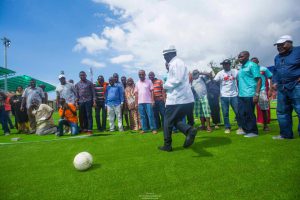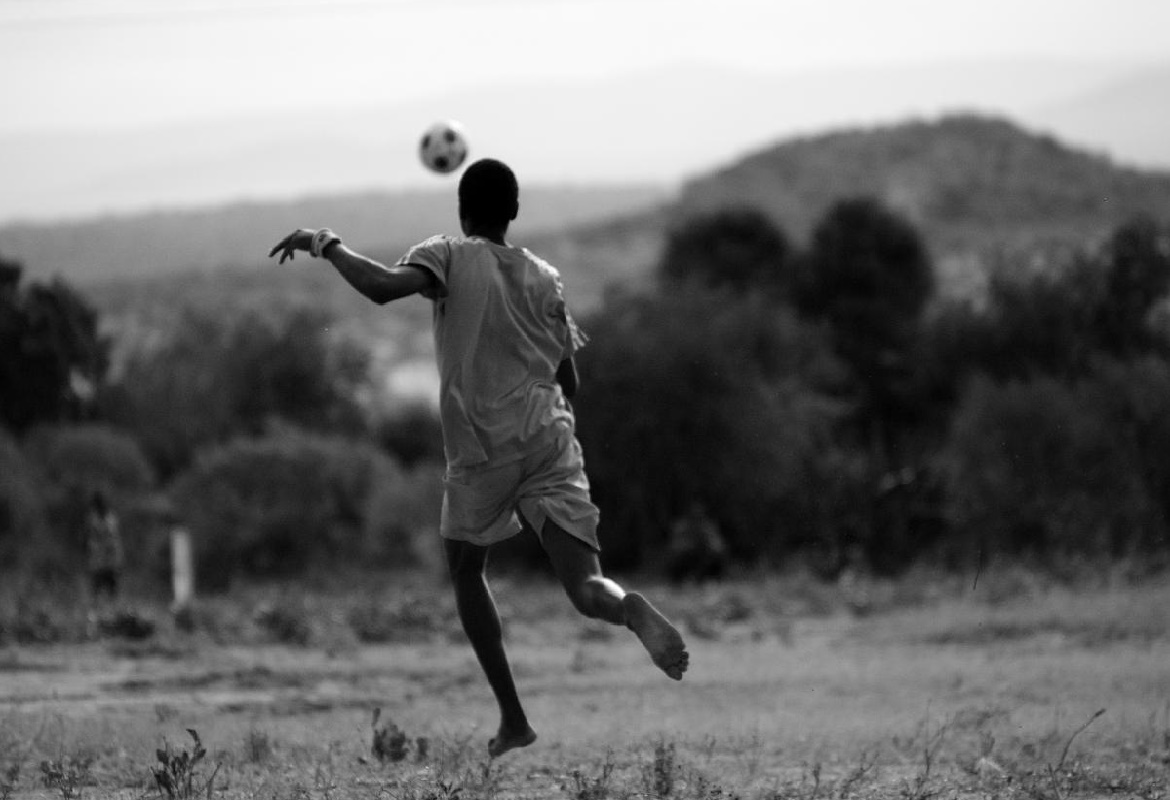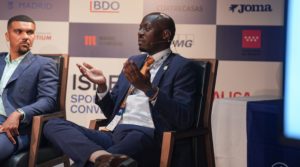Football is just a game. However, because of the number of people involved in the sport it has become very much integrated with world affairs. Football impacts Political, Economic, Social and Technological (PEST) aspects of the world.
In this analysis I will look at these four areas using Kenya as a case study. Kenya is listed as a developing country with a population of about 48 million.1 Football is the most popular sport in the country. The Football Kenya Federation (FKF), is in charge of football with a registered company Kenya Premier League (KPL), entrusted with running the top league.
Politics. When it comes to politics, football in Kenya has been used as a soft power base by those wishing to gauge and or grow their influence with a view of venturing into national politics. This is especially the case with the two clubs with the richest history and commanding the biggest following in Kenya, Gor Mahia FC and AFC Leopards SC – the Barcelona and Real Madrid of Kenya. The two clubs are more or less run by members, a similar model to what we have at the two Spanish clubs. They are both community clubs with AFC predominantly Luhya and Gor Mahia getting its fan-base from the Luo community. Many elected officials and patrons of these two clubs have gone on to become members of the county assemblies (MCAs), members of parliament (MPs), senators a and governors, using their club positions as a spring board to national politics. Luhya and Luo communities also happen to provide 2 of the largest voting blocks in the country. Politicians are known to grace the derby matches involving the two clubs sometimes donning their party colours. They use football as a platform to access the masses and drive their political agendas.
“There is more politics in football than in politics.”- Sven Goran Eriksson

Another interesting trend is also playing out in the run-up to the 2017 elections with politicians aspiring for office using their sports development record as a campaign tool. This is evidenced by the development of sports infrastructure mainly by the incumbents who have gone on to point this as being part of their agenda for the youth – improving access to sports facilities. In the last 5 years we have seen the construction of Machakos stadium, Kinoru stadium, Uwanja wa Mbuzi (loosely translated goats’ field) and more recently Gikambura stadium in Kiambu…just in time for the elections. Also interesting is that part of the ruling party’s manifesto while campaigning in the last elections was the construction of 5 world class stadiums. In my view they were unable to fulfill this promise but at the same time I do not believe this was the right strategy. A more sustainable approach is required. This article on infrastrategy proposes one approach.
Economics. The picture can be negative, as the sport is not highly developed. There is a lack of professionalism and governance issues have proved to be stumbling block. However, owing to the number of people involved in the game, you cannot underestimate the potential impact of football on Kenya’s economy. Currently, with commercial media (Super Sport et al) getting into the sport, professionalism is trickling in at the top level making football an employer for the youth. Corporate sponsors such Safaricom, East African Breweries Ltd, are also getting involved, pumping money into the game providing the needed stimulus, while also marketing their products.
Social. Football is one game played by all. School going children in Kenya start playing at a very early age and this enables one to develop certain key social skills. Also, numerous projects have been launched with a view of helping youths develop socially and stay away from social ills. Mathare Youth Sports Association is one such initiative. Recently Ken Oliech, a former Kenya international and older brother to one of Kenya’s best exports Dennis Oliech (co-founder), launched the Ken Oliech Foundation. The aim of the foundation is to help youths to develop their football skills while providing them with mentors who include current and former players. These initiatives are good but it is not easy to measure their real impact apart from the few success stories such as Dennis Oliech who grew up in the slums of Nairobi but went on to play for clubs such as Nantes and Auxerre in France.
Football has also aided in social integration. Teams travel across the country for their matches in the process discovering cultures that they would otherwise not have encountered. While I was playing I was privileged to visit areas in my country that I would never have imagined. This provided me with a better understanding of my country’s people. I believe my teammates and the many others who travel both locally and internationally have the same experience. I remember visiting areas where children would stare at us in awe because we were ‘different’. It is with this that I can understand how certain social problems, such tribalism and nepotism, might have found there way into the Kenyan society – a lack of exposure. Football in Kenya has exposed many like me to their own country.
Technologically there is not much that can be said about the sport in Kenya as usually developments in this area come from the developed countries. The third platform comprising of mobile computing, social media, cloud computing and big data hold a lot of promise in this area. For example, social media has made it possible to follow live matches from practically anywhere around the globe. Recently around the world, we have also seen a push towards fan ownership of clubs, in order to preserve club heritage. Such initiatives can be supported through crowdfunding, a relatively new method of financing. Popular clubs like Gor Mahia and AFC Leopards could explore this kind technological innovation to support their activities while consolidating and growing their fan base.
Indeed football touches many if not all aspects of our society. This article, being a first, barely scratches the surface and it is my plan to delve deeper into the beautiful game in subsequent articles.
This post is dedicated to a good friend, a super teammate (Strathmore University FC) and a great fan of the game – Allan “Obama” Onyango or as some of us fondly referred to him, Babaa. Rest well Babaa.






Cheers brian for the article and as they say a journey of a thousand miles start with a step. My contribution; the article could have been enriched with a PESTL approach where ‘L’ delving into legal aspects of the beautiful game. The legal implications of crowd troubles in the major derby, players not honouring contracts and or clubs failing to honour contracts to players and the technical bench, the sport legal framework its suitability or lack of it, mismanagement of funds from sponsors and gate collections which is a major thorn in the game as a few people enrich themselves and last but not least the perennial tussle between the government on one side and Fotball federations backed by FIFA on the other which in many occassions has been a bottle neck in weeding out the bad elements in ‘Jogo pinto’. Cant wait for the next article keep on keeping on
Thank you very much for your insights Muteithia. In future articles I will attempt to address the legal side of things.
Wisely spoken my bro. The fact that you been a player before opened your eyes. I am proud to see this page; proud to have shared some of the travel moments with you.
Football in Kenya is a total mess, me being a victim, sidelined because of tribalism and nepotism…
Keep writing, and address issues in Kenya…
I also wish our former teammate Allan ‘Obama’ a peaceful rest.
Thank you for your remarks Jijoh. Also proud to have a played with you and hopefully one day we will reap from our talents and hard work.
A good article. rest in peace super defender Allan
Thank you Morris!
Am impressed with your article PEST and how you have exquisitely linked it with football, how about you doing the same with SMART or SWOT?I believe with such articles and passionate guys like you in football matters one day we will see our Kenyan football where we have dreamt it to be
Thank you Salim. Indeed I am looking at borrowing from various business models to analyse the state of the game with a view of providing a way forward.
nice read
Thanks Michael
Nice read Brian and good start. May be I should borrow a leaf from you and start writing about football as well. I really like Muteithia’s point regarding the game and the law as my research paper for my Law degree was actually on Sports and the Law. Will try and see whether I can get a copy of my work and share as I had done some extensive research especially on hooliganism and issues such as whether an assault (such as a headbutt) during play can be taken out of the filed and dealt with in Court such as Brandao’s case on the headbutt to Tiago Motta.
Continue the goodwork and I would like you to in the near future talk about the plight of young footballers and how they are wasting their small riches instead of investing. That should be an eye opener…Kudos Brian…we support you..and lastly..May Alan RIP and we thank God for his memories..
Thank you Toddy for your remarks. Actually when I read Muteithia’s comments you were the first person that came to mind. When I come round to doing an article on the legal issues, I will definitely borrow from your expertise in sports and law. I can also feature you as a guest writer.
I appreciate your good comments, ideas for future articles and support.
Your passion for the sport echoes in your thoughts (very well expressed I must say); Mine is to encourage you to stay the course and be consistent in sharing with us your insights. I hold you to many more articles. Hongera!
Thank you for your good comments and encouragement Alphonce.
Nice one bro wish we could find the leaders who really value football or rather soccer in Kenya…….RIP BABAA..
Hi Brian: I see you have already received plenty of encouragement so it doesn’t really need me to say ‘Keep writing.’ But I will say it all the same – keep writing!
You asked me a while back to comment on your blog from my perspective as a former soccer writer so here goes…
There is a major difference between what you are doing and what I did. I was basically a British tabloid reporter, writing ‘snappy’ stuff like ‘Alex Ferguson was fuming yesterday over reports that he threw a tea cup at David Beckham’… (only joking but you know what I mean). But you are looking at the game from an academic point of view.
It’s my belief, having retired from journalism, that your method is more important, more valid, than mine ever was. Football, indeed all sport, needs proper research and evaluation to keep it moving – particularly in countries such as Kenya.
One point I would make is the development of writing style. You want your material to reach as many people as possible, and then to ensure that you keep those followers interested. Some academic material can become too weighty. I think you are on the right tracks. Possibly you could throw in a few anecdotes from your own playing experiences?
But overall I’m delighted that you are having a go. Good luck, Colin Evans.
Thank you for your comments Colin. You are actually the reason I started writing and I hope I can ‘keep writing’. I do agree that I am taking a rather academic approach as I want to touch on issues of sport(football) and development. However, I will try try to draw for my playing experience as much as possible and probably include some of the ‘snappy’ where appropriate. Counting on your support and it’s an honour to have your experienced audience.
Great to see that your passion for football has got you writing ! Congratulations…looking forward to reading more on your journey. Keep writing. Irene Ngigi.
Thanks for the support Irene. Will do my best to keep writing!
Awesome perspective!
Thanks Simon
Pingback: Saving the Leopard | Brian Wesaala
Better late than never,right?! I can tell I will enjoy the ride. Insightful first article.
Thank you Sharonne! Glad to have you with us…enjoy! Your criticism is highly appreciated.
Pingback: Ethnicity and Football | Brian Wesaala
Pingback: The Year of Return - Part One | Brian Wesaala
Pingback: The Year of Return - Part Two | Brian Wesaala